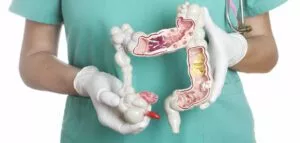Colorectal Cancer
- Home
- / Oncology
- / Colorectal Cancer
Colorectal Cancer:
When cancer is diagnosed in the colon or the rectum, it is termed Colorectal cancer. These cancers can also be called colon cancer or rectal cancer, depending on where they start. Colon cancer and rectal cancer are often grouped together because they have many features in common.
Colon (colorectal) cancer starts in your colon (large intestine), the long tubular organ of the digestive system that carries digested food to your rectum and exits the body.when the treatment is not taken in early stages.

Colon cancer develops from certain polyps or growths in the inner lining of your colon. Timely detection and screening of these precancerous polyps need to be treated before they develop into cancerous tumours. Colon cancer that’s not detected or treated does remain localised but may spread to other areas of the body.
Symptoms
- A change in bowel habits, such as more frequent diarrhoea or constipation.
- Rectal bleeding or blood in the stool.
- Ongoing discomfort in the belly area, such as cramps, gas, or pain.
- A feeling that the bowel doesn’t empty all the way during a bowel movement.
- Weakness or tiredness. (Occurs due to blood loss caused by bleeding from the cancer.)
- Losing weight without trying.
The underlying factors that increase the risk of colon cancer are:
Lifestyle choices:
Smoking: using tobacco products, including chewing tobacco and e-cigarettes (vaping).
Excessive alcohol use: Even light alcohol use can increase your risk of developing cancer.
Obesity: Consumption of high-fat, high-calorie foods may affect your weight and increase your risk of colon cancer.
Diet: Having a diet that includes lots of red meat and processed meat: Processed meat includes bacon, sausage, and lunchmeat.
Not exercising: Any kind of physical activity may reduce your risk of developing colon cancer.
Medical conditions that increase colon cancer risk:
- Inflammatory bowel disease.
- Inherited conditions
- A family history of colon and other kinds of cancer
- Many polyps
What can Be done?
Sceening for COLORECTAL CANCER:
Every individual who is above 50 years of age is recommended to undergo a full-length colonoscopy once every 5 years. Or an annual sigmoidoscopy.People with a family history of colon cancer should start screening early after consulting a gastroenterologist or a cancer surgeon.
Every elderly person with anaemia (low haemoglobin levels) has to be screened for colon and rectal cancers.

